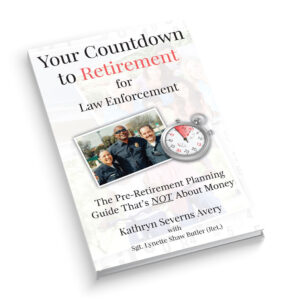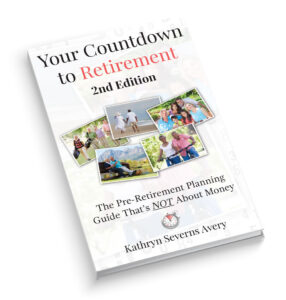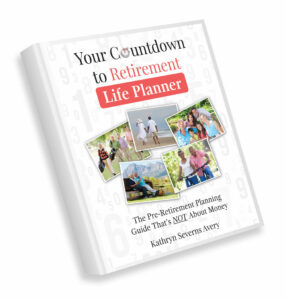It's Not Just About the Money!
Silver Tsunami Warning
-
Author : Your Countdown to Retirement
Date : February 12, 2019
Category : Lifestyle, Meaningful Retirement, Redefining Retirement, Relationships, Retirement Planning
Comments : 0
Like : 0

by Kathryn Severns Avery
While my husband and I were at dinner with two other baby boomer couples, the conversation turned to the topic of retirement. The three men at the table have completely different ideas about how they will enter into retirement. One wants to cease working altogether; the second wants to work part-time or consult and eventually stop working; the third plans to launch a new business. Each man’s idea of retirement is right for him, yet the three scenarios outlined at dinner require different mindsets, resources, and support structures to be successful.
The wives at dinner are also in different phases of retirement. One is retired and is pursuing pleasurable activities; another plans to continue working for five or more years. My plan is to continue working while launching a new business with my husband.
The relationships dynamics of all three couples will be affected by these choices. When one man at dinner said he’d like to retire in the next six months, his wife’s response was “I’m not sure I’m ready for you to retire yet.” Clearly all three couples had thought about retirement but only in vague, generalized, terms. No in-depth conversations about the many issues involved in transitioning from working to not working had yet taken place.
Many baby boomers are reluctant to begin planning for their retirement believing that it is still many years away. Some cannot conceive of a life where they are not working. Their primary identity is defined by their work and career. For others, however, retirement is not by choice. It results from corporate downsizing, market shifts, accident, or illness.
At the time we were having dinner together, none of three couples had a comprehensive retirement plan that looked at both the financial and emotional implications of transitioning from working to not working. My husband and I learned of the unanticipated identity crisis often experienced in the first years of retirement by watching friends work their way through it. It was not a pretty sight. Those going through the experience used the same three words to describe their feelings: irrelevant, invisible, and bored. We had never thought of the emotional ramifications of not working. Yet, it now seems obvious that one would feel a host of difficult emotions when no longer earning a living by using skills, talents, and abilities honed over a lifetime.
As the result of our leading edge baby boomer friends’ experiences, we quickly realized there were aspects of retirement we were unaware of and for which we were totally unprepared. My husband and I hadn’t thought about the possibility of one spouse retiring and the other resenting the retiree’s free time. What about the hidden fears that often surface about one’s worthiness, esteem, and lovability when the structure and stability of work have been removed? How would we handle those fears? When working, we enjoyed spending time together. But how would that change when the eight or more hours of time spent apart disappeared in retirement?
I realized that I was not alone in my denial of my unpreparedness for retirement. There are approximately 76 million baby boomers in this country as unprepared to grapple with these issues as I am. As a result of this new awareness, I launched a mission to become an expert in planning for the non-financial aspects of retirement and how best to help other baby boomers prepare for this difficult stage of life. The need to break through baby boomer’s denial and spur them into action is crucial for their future well-being.
There is an ever-shortening window of opportunity to prepare for this unprecedented change in American demographics. In 2030, when all baby boomers will have turned 65, more than 100 million people in our country will be 65 and older. This has never before happened in the history of our country.
While money cannot buy you happiness, lack of money can sure make you feel unhappy. One in three Americans has $0 put away for retirement according to an online article in Money. Fewer still have researched, prepared for, and planned ways to spend their time in retirement that are rewarding and fulfilling. Yet many boomers continue to stick their heads in the sand and fail to recognize the enormity of the situation they face.
The nonchalance exhibited by those born between 1946 and 1964 for this fast-approaching phase of life is disturbing. The Silver Tsunami, the tidal wave of baby boomers who have turned or are about to turn 65, is upon us. The sea has started to recede from the shore.
If you or someone you love is about to retire, or has retired, and is ready to start exploring, planning, and preparing for the next stage of life, contact us! Or, visit us at our What’s Next for Boomers Life Planning Center.





